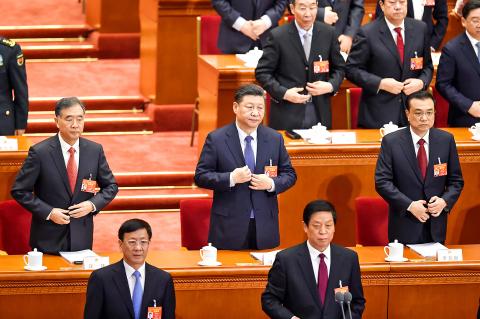The government strongly condemns China’s interference in Taiwan’s internal affairs and the freedom of its press, President Tsai Ing-wen (蔡英文) said yesterday.
Authorities have long been aware of China’s attempts to influence and pressure local media and a statement by Chinese People’s Political Consultative Conference Chairman Wang Yang (汪洋) only confirmed this, Tsai said.
Wang on Friday said that Taiwanese media should give more coverage to Beijing’s “one country, two systems” framework.

Photo: AFP
Wang made the statement following a media summit in Beijing organized by the Beijing Daily Group and cohosted by Taiwanese media company Want Want China Times Media Group (旺旺中時集團).
Other Taiwanese media companies in attendance included United Daily News Group (聯合報), Eastern Broadcasting Co (東森電視) and TVBS Media (聯利媒體).
Freedom of speech and freedom of the press are elements of a democracy most worth cherishing, Tsai said, adding that “we must strive together” to protect those freedoms.
She would ask national security authorities to closely monitor the situation, Tsai said.
The Ministry of Foreign Affairs said on Twitter that China has one goal: “Defeat from within front-line state Taiwan’s defense of freedom & democracy.”
On Saturday, the Mainland Affairs Council also criticized Wang, saying he was “using a cross-strait media summit as a platform for political propaganda.”
Taiwanese media companies should avoid helping the Chinese Communist Party in its “united front” efforts, it said.
Beijing has been ramping up and diversifying its interference in Taiwanese society since Chinese President Xi Jinping’s (習近平) speech marking the 40th anniversary of Beijing’s “message to compatriots in Taiwan,” the council said.
In the speech, Xi extolled China’s “one country, two systems” framework, describing it as the only peaceful alternative to forcible unification through military force.
The nation’s media have a responsibility to uphold the principles of fairness and impartiality in their reporting, and to defend the nation’s hard-fought freedom of the press and freedom of speech, the council said.
Presidential Office spokesperson Xavier Chang (張惇涵) on Saturday said he hoped that media at the summit in Beijing would report on the “brave spirit of criticism” of China that is displayed in Taiwanese society.
That spirit was one of explicit opposition to China’s “united front” efforts, he said, adding that media companies should assist the government and the public in opposing such tactics.
The government was in the process of developing a robust defense network to protect the nation’s democracy and ensure freedom of speech, he said.
Additional reporting by Yang Chun-hui

A Ministry of Foreign Affairs official yesterday said that a delegation that visited China for an APEC meeting did not receive any kind of treatment that downgraded Taiwan’s sovereignty. Department of International Organizations Director-General Jonathan Sun (孫儉元) said that he and a group of ministry officials visited Shenzhen, China, to attend the APEC Informal Senior Officials’ Meeting last month. The trip went “smoothly and safely” for all Taiwanese delegates, as the Chinese side arranged the trip in accordance with long-standing practices, Sun said at the ministry’s weekly briefing. The Taiwanese group did not encounter any political suppression, he said. Sun made the remarks when

The Taiwanese passport ranked 33rd in a global listing of passports by convenience this month, rising three places from last month’s ranking, but matching its position in January last year. The Henley Passport Index, an international ranking of passports by the number of designations its holder can travel to without a visa, showed that the Taiwan passport enables holders to travel to 139 countries and territories without a visa. Singapore’s passport was ranked the most powerful with visa-free access to 192 destinations out of 227, according to the index published on Tuesday by UK-based migration investment consultancy firm Henley and Partners. Japan’s and

BROAD AGREEMENT: The two are nearing a trade deal to reduce Taiwan’s tariff to 15% and a commitment for TSMC to build five more fabs, a ‘New York Times’ report said Taiwan and the US have reached a broad consensus on a trade deal, the Executive Yuan’s Office of Trade Negotiations said yesterday, after a report said that Washington is set to reduce Taiwan’s tariff rate to 15 percent. The New York Times on Monday reported that the two nations are nearing a trade deal to reduce Taiwan’s tariff rate to 15 percent and commit Taiwan Semiconductor Manufacturing Co (TSMC, 台積電) to building at least five more facilities in the US. “The agreement, which has been under negotiation for months, is being legally scrubbed and could be announced this month,” the paper said,

MIXED SOURCING: While Taiwan is expanding domestic production, it also sources munitions overseas, as some, like M855 rounds, are cheaper than locally made ones Taiwan and the US plan to jointly produce 155mm artillery shells, as the munition is in high demand due to the Ukraine-Russia war and should be useful in Taiwan’s self-defense, Armaments Bureau Director-General Lieutenant General Lin Wen-hsiang (林文祥) told lawmakers in Taipei yesterday. Lin was responding to questions about Taiwan’s partnership with allies in producing munitions at a meeting of the legislature’s Foreign Affairs and National Defense Committee. Given the intense demand for 155mm artillery shells in Ukraine’s defense against the Russian invasion, and in light of Taiwan’s own defensive needs, Taipei and Washington plan to jointly produce 155mm shells, said Lin,